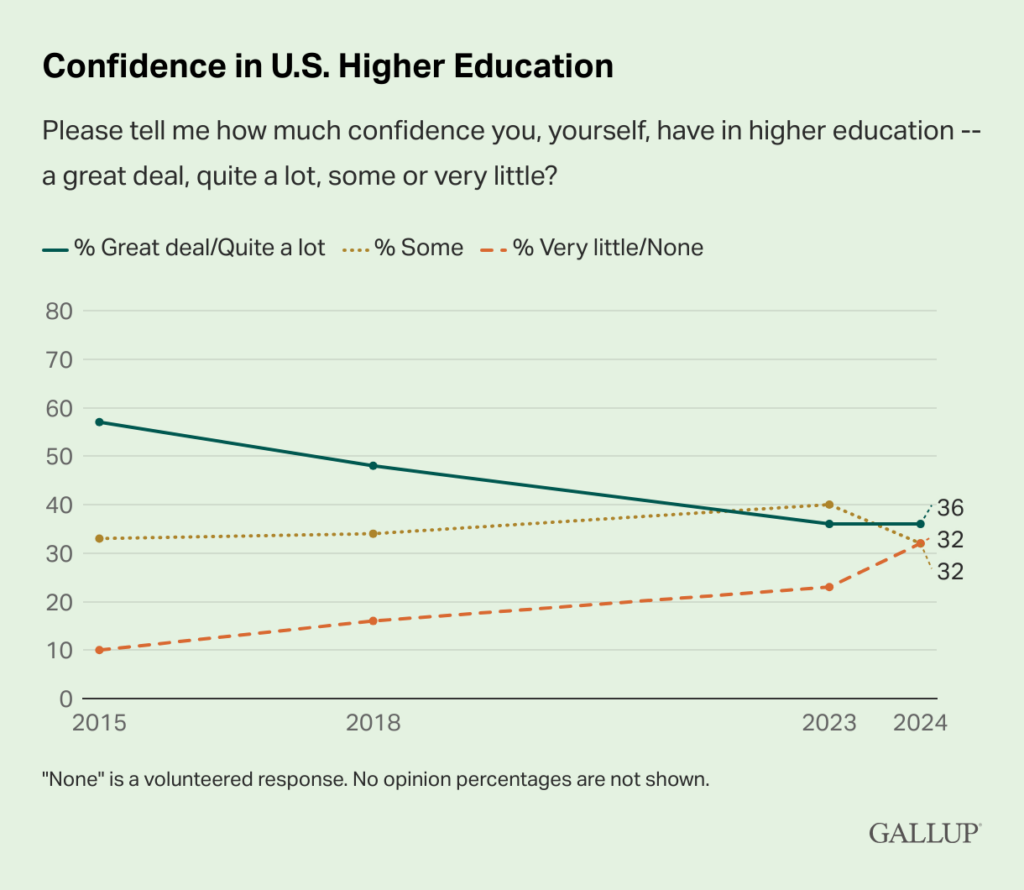Universities’ role as the nerve centre of the country’s culture wars has not helped with their popularity. According to Gallup, only a third of Americans have a “great deal” or “quite a lot” of confidence in higher education, down from 57% in 2015. Amid disruptive campus protests and numerous high-profile antisemitism scandals and plagiarism accusations — one resulting in the resignation of Harvard’s president — it’s no wonder they’re struggling with their image.

The decline in confidence has been driven by Republicans, among whom support for higher education fell from 56% in 2015 to 20% in the present. Respondents’ leading concern was higher education’s political agenda. Will the kids be alright?

 Main Edition
Main Edition US
US FR
FR





Join the discussion
Join like minded readers that support our journalism by becoming a paid subscriber
To join the discussion in the comments, become a paid subscriber.
Join like minded readers that support our journalism, read unlimited articles and enjoy other subscriber-only benefits.
SubscribeThat trend is exacerbated when people realize that the campus mentality will soon infect their organizations. Who doesn’t look forward to that?
A few organizations and individuals here have decided to forego recruiting from some of the more woke schools. In fact, some schools hired professionals to help clean the social media profiles of their students involved in pro-Hamas protests.
Universities lost their way ages ago, when they decided that instead of seeking knowledge and facts, they should try to “change the world.”
People who are successful in changing the world almost invariably change it for the worse, from Suleyman to Stalin.
Their tarnished reputations are well deserved. For me it began with student loan forgiveness. My parents and I saved for my college education and I went to a state school. Quite affordable. I had a very small loan for graduate school which I paid off in three years. My starting salary was a little over three times the entire cost of college (BS/MBA).
My wife and I saved for our children’s education and wrote full freight checks every semester. When President Obama proposed student loan forgiveness, we asked, “What about us?” Sorry.
Since 1980, average college tuition increased about 6% per year, whereas the average annual inflation rate is about 3% per year. Why? Several colleges have multi-billion dollar endowments and still raise tuition every year. Colleges load up on administrators and non-teaching staff, such as DEI police, er people, as well as now have some fancy facilities. Its too easy to get a student loan, regardless of the major (say Dance versus Mechanical Engineering), the cost or the future employment prospects. The colleges get paid right away and hold no skin in the game. If I don’t pay my auto loan, the auto dealer can reposes it and try to sell it. The auto dealer may lose money on the process. If I don’t pay my student loan, there is no hit to the college. Here in the US, the other taxpayers take the hit.
We used to have elite institutions, Harvard, Yale, Princeton. Notice how more elite the school, the more likely that there were anti-Israel pro-Hamas protests? If you can afford a tent, do you need the rest of us to pay off your student loan? How about paying off the truck loan my landscaper has?
Washington Monthly June 23, 2024 edition reported that, “At private colleges, protests have been rare, encampments have been rarer, and both have taken place almost exclusively at schools where poorer students are scarce and the listed tuition and fees are exorbitantly high.” In addition, elite colleges have large percentage of foreign students paying, or having their government pay full freight. For example, Harvard at 23%, Columbia 17%.
According to USA Today, “As of the first quarter of 2023, student loan debt in the U.S. stands at a total of over $1.77 trillion.”
People such as those who paid off their debt, went to lower cost schools, did not go to college and or have children contemplating college are beginning to ask, “Is this worth it in all or many cases.”
“Big Academia” in the U.S. is like the healthcare system. Both cost more per capita than anywhere else in the world. Neither exists to serve its constituency. Both enrich the system at the expense of citizens and return mediocre objective results when compared to metrics elsewhere.